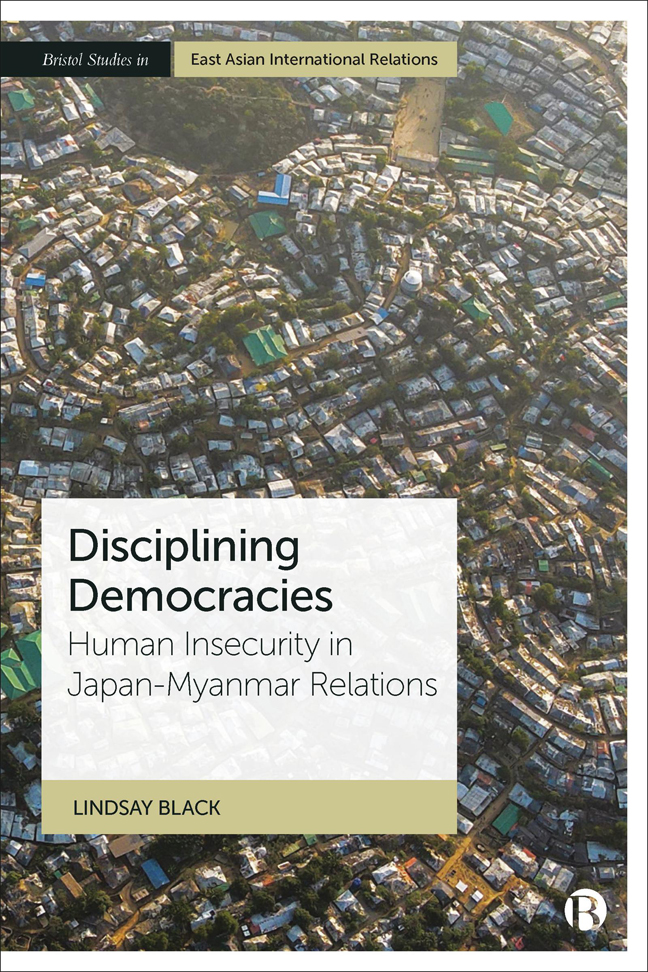Book contents
- Frontmatter
- Dedication
- Contents
- List of Abbreviations
- Acknowledgements
- Introduction
- 1 The Evolution of New Area Studies
- 2 ‘Asia's Liberal Leader’ and Human Insecurity
- 3 Japan as a ‘Bridge’: Facilitating Myanmar's Transition to a ‘Disciplined Democracy’
- 4 Japan and Special Economic Zones in Myanmar
- 5 Meddling for Profit: Japan's Peace-building Role in Myanmar
- 6 Dereliction of Responsibility: Japan's ‘Liberal Leadership’ in the 2016–20 Rakhine Crisis
- Conclusion: The Chimera of Progress
- Notes
- References
- Index
Introduction
Published online by Cambridge University Press: 25 January 2024
- Frontmatter
- Dedication
- Contents
- List of Abbreviations
- Acknowledgements
- Introduction
- 1 The Evolution of New Area Studies
- 2 ‘Asia's Liberal Leader’ and Human Insecurity
- 3 Japan as a ‘Bridge’: Facilitating Myanmar's Transition to a ‘Disciplined Democracy’
- 4 Japan and Special Economic Zones in Myanmar
- 5 Meddling for Profit: Japan's Peace-building Role in Myanmar
- 6 Dereliction of Responsibility: Japan's ‘Liberal Leadership’ in the 2016–20 Rakhine Crisis
- Conclusion: The Chimera of Progress
- Notes
- References
- Index
Summary
On 1 February 2021, the Myanmar military, or Tatmadaw, under the command of General Min Aung Hlaing, staged a coup d’etat, ousting the democratically elected National League for Democracy (NLD) government led by Aung San Suu Kyi. Together with members of her party, Aung San Suu Kyi was incarcerated on trumped up charges. Citizens who took to the streets in protest were gunned down or arrested. For those knowledgeable of Myanmar's recent history, the scenes were depressingly familiar. The coup ended Myanmar's transition to a ‘disciplined democracy’ and was widely condemned by the international community. The Japanese government was less critical of the coup, maintaining ties with the government of General Min Aung Hlaing and seeking to mediate between his government and the opposition forces. Japan's substantial economic investments in Myanmar since its transition to a ‘disciplined democracy’ meant that it had much to lose from the country becoming once again estranged from the liberal international order. As ‘Asia's liberal leader’, Japan could also claim a duty to entice Myanmar back onto the path to democratization. The Japanese government's engagement with Myanmar concerned not only material benefits, but also international status.
This monograph charts the course of Japan's relationship with Myanmar from the passage of Myanmar's constitution in May 2008 to the 1 February 2021 coup d’etat that brought an end to Myanmar's democratic transition. It places the Japan–Myanmar relationship in historical context to understand how this relationship evolved and what Japan's contemporary commitments to and ambitions in Myanmar are. While the few accounts of this relationship note Japan's geoeconomic and geopolitical interests in the country, the significance of Myanmar's democratic transition for Japan's status as ‘Asia's liberal leader’ has been side-lined. It is necessary to understand why Japan follows a distinct approach in its relations with Myanmar. This monograph sets out not only to correct this omission, but also shed light on the contradictions of Japan's pursuit of both its national interests and a ‘value-based diplomacy’ when these undermined the security of human beings in Myanmar and of those who had fled across its borders.
- Type
- Chapter
- Information
- Disciplining DemocraciesHuman Insecurity in Japan-Myanmar Relations, pp. 1 - 16Publisher: Bristol University PressPrint publication year: 2023



